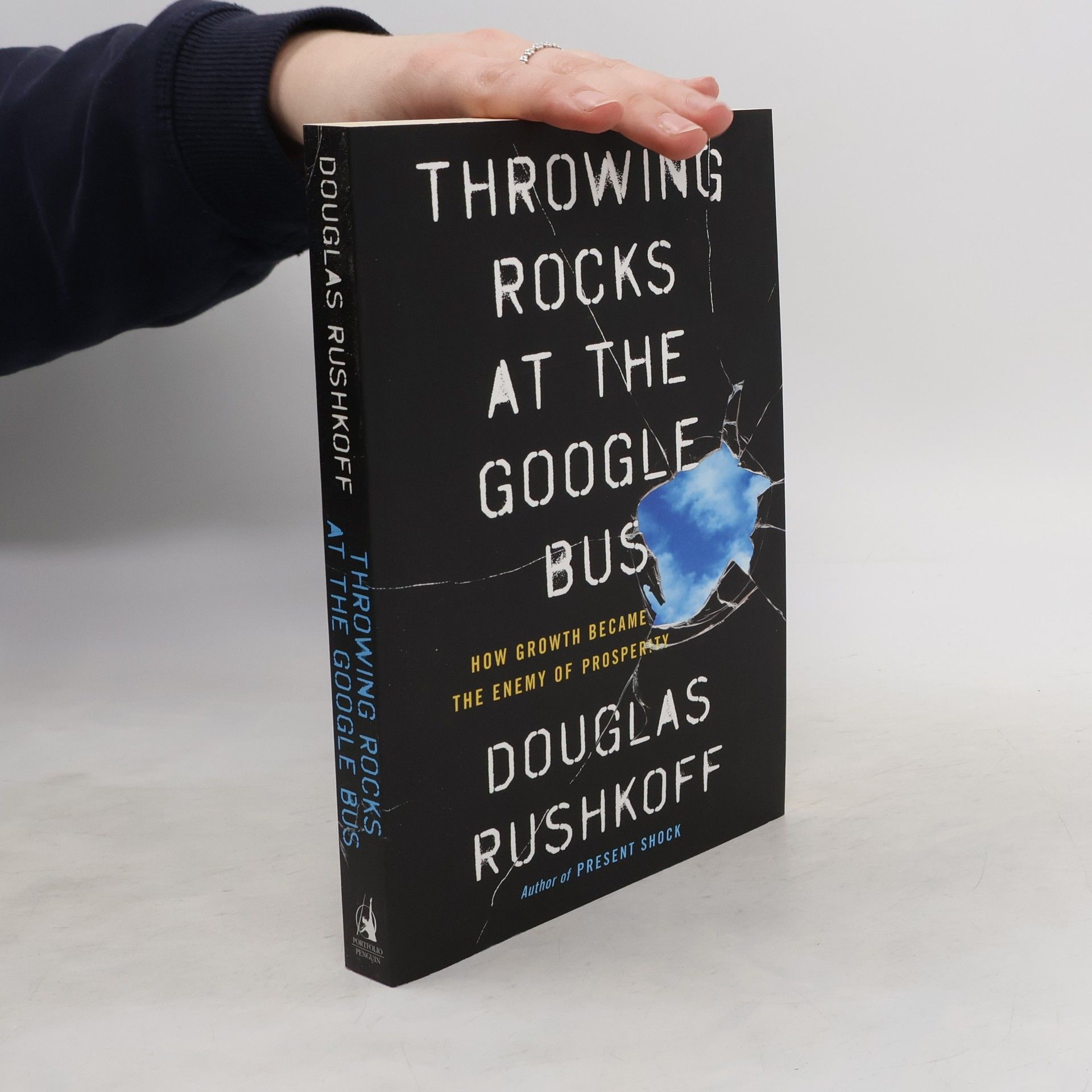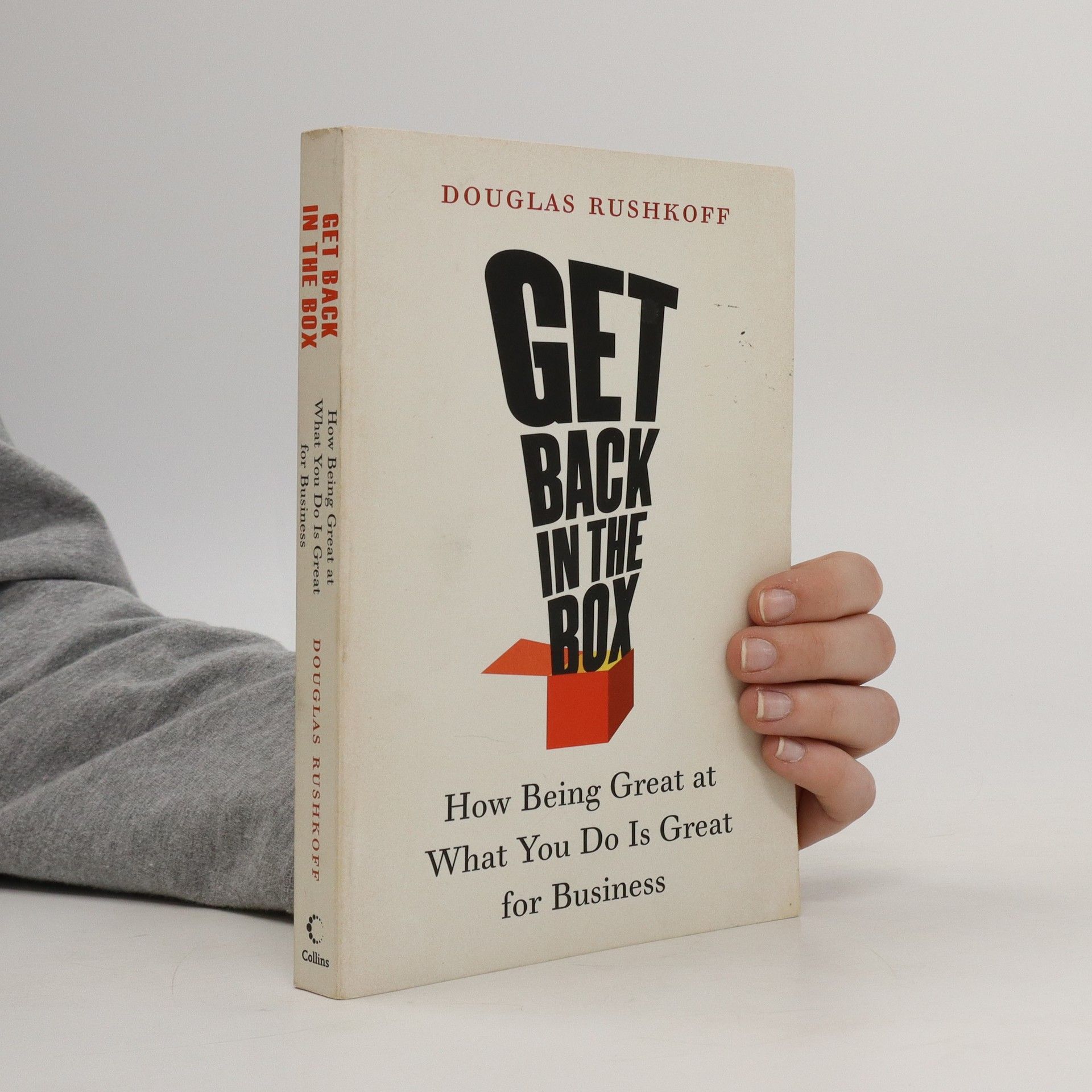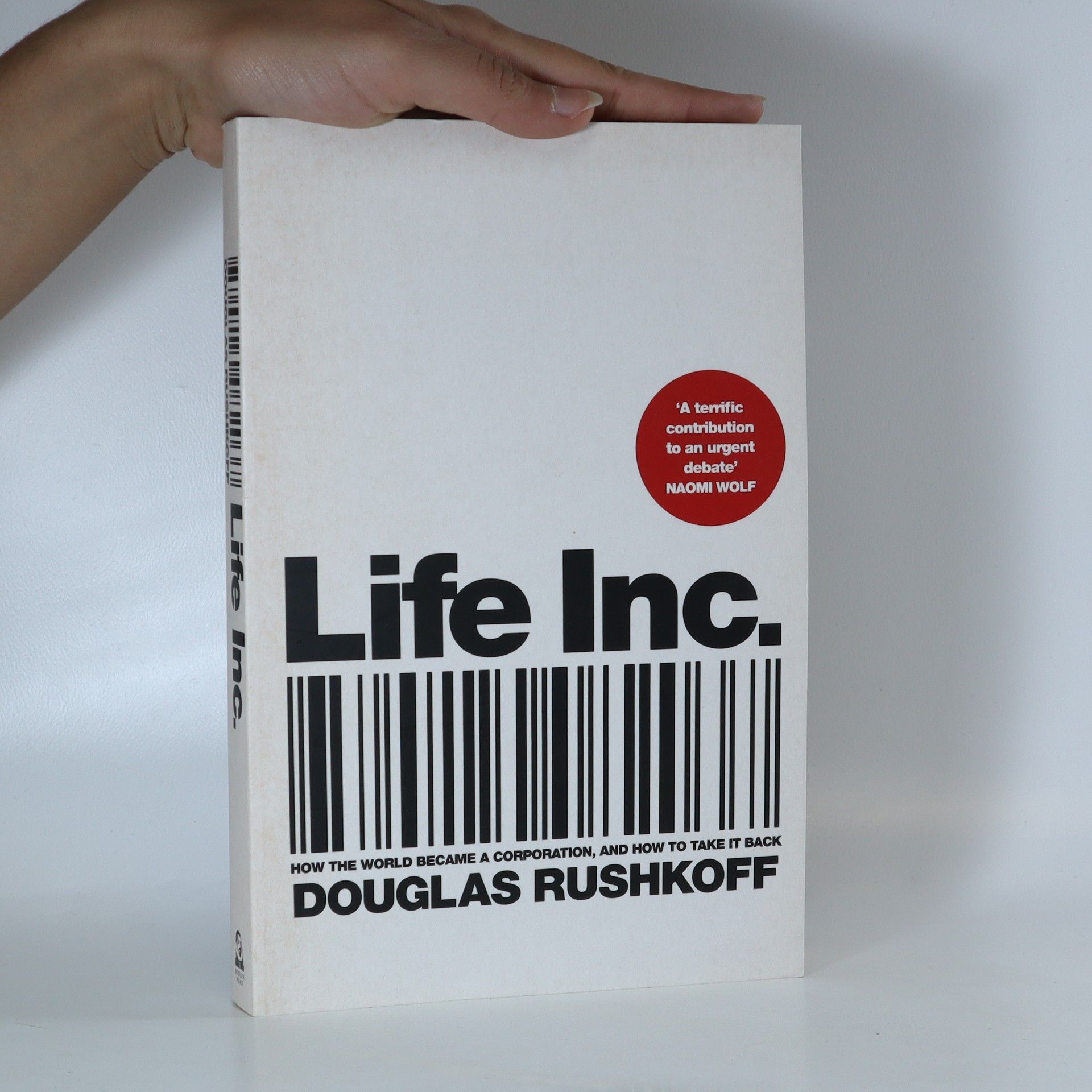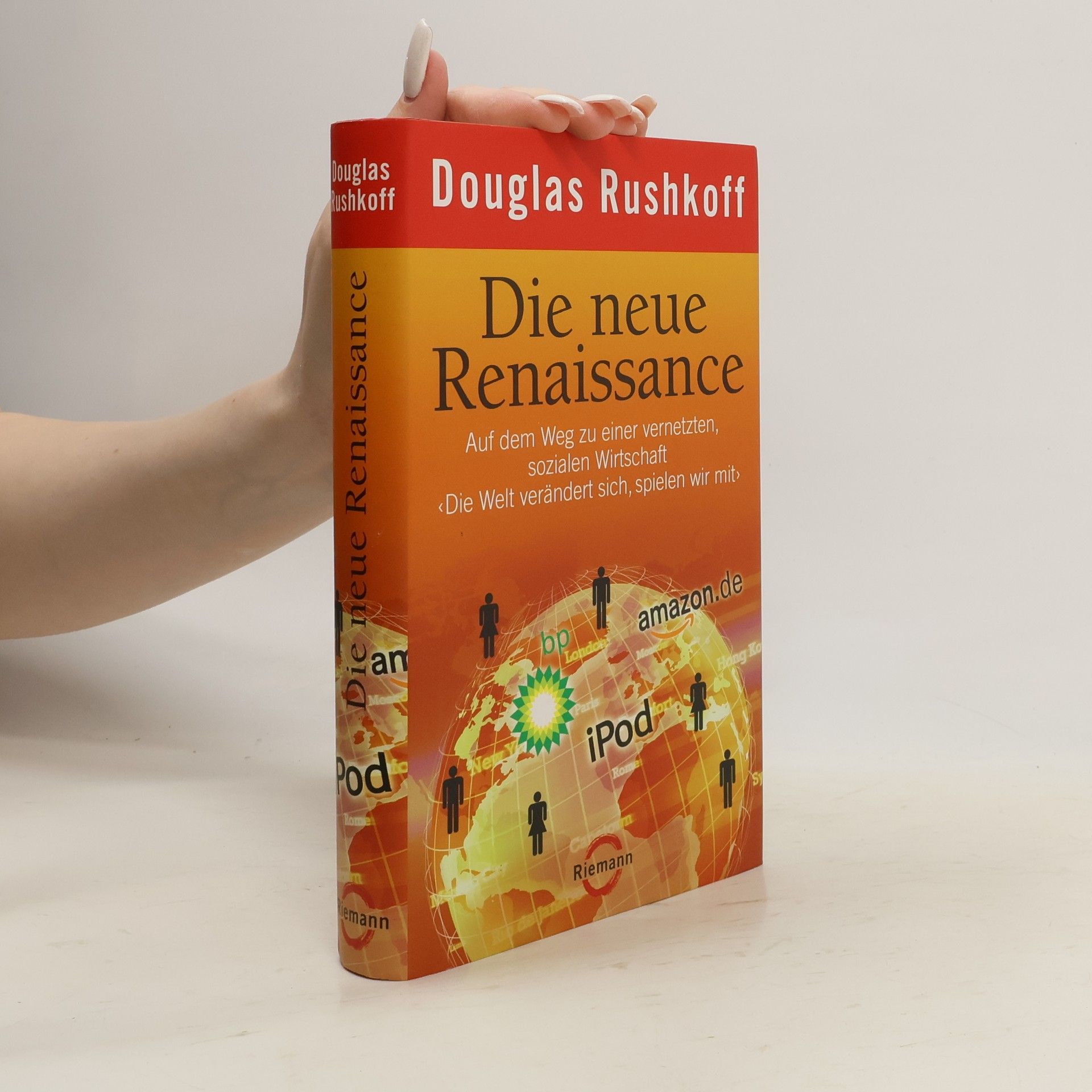The tech elite have a plan to survive the apocalypse: they want to leave us all behind. When Douglas Rushkoff was summoned to the desert to a private talk for the rich and powerful, he learned about 'The Mindset': a theory that inevitable societal catastrophe can be evaded by individuals with enough money and the right technology. Here, Rushkoff traces the evolution of The Mindset through its origins in science and technology to its current expression in missions to Mars, island bunkers, and the Metaverse. This mind-blowing work of social analysis shows us how to transcend the landscape The Mindset has created -- a world alive with algorithms and intelligences actively rewarding our most selfish tendencies -- and rediscover community, mutual aid, and human interdependency.
Douglas Rushkoff Book order (chronological)
Douglas Rushkoff is a writer, columnist, and lecturer focusing on technology, media, and popular culture. His work critically examines the impact of these forces on society and human behavior. Rushkoff delves into how the digital realm shapes our thoughts and interactions. His insights into contemporary trends offer a profound understanding of the information age.







Better Work Together
How the Power of Community Can Transform Your Business
- 289 pages
- 11 hours of reading
This is not a book of theory. It’s a collection of real stories and tools from the front lines of the future of working together.Learn to create radically collaborative, caring workplaces.
Team Human
- 256 pages
- 9 hours of reading
Porchlight’s Management and Workplace Culture Book of The Year “[A] thoroughly fascinating exploration of the long interplay between power and the technologies of communication.” —Adam Frank, NPR Team Human is a fiery distillation of preeminent digital theorist Douglas Rushkoff’s most urgent thoughts on civilization, technology, and human nature. In one hundred concise statements, he argues that we are essentially social creatures who achieve our greatest aspirations when we work together not as individuals. Yet today, an antihuman ethos has overtaken our society, undermining our ability to connect. Technologies that were meant to foster cooperation from currency to computers too often are used to exploit and divide us. If we are to adapt and survive these destructive forces, we must recognize that being human is a team sport. Rushkoff inspires us to find the others who understand this fundamental truth and reassert our humanity together.
Throwing Rocks at the Google Bus
- 304 pages
- 11 hours of reading
Why doesn’t the explosive growth of companies like Facebook and Uber deliver more prosperity for everyone? What is the systemic problem that sets the rich against the poor and the technologists against everybody else? When protesters shattered the windows of a bus carrying Google employees to work, their anger may have been justifiable, but it was misdirected. The true conflict of our age isn’t between the unemployed and the digital elite, or even the 99 percent and the 1 percent. Rather, a tornado of technological improvements has spun our economic program out of control, and humanity as a whole—the protesters and the Google employees as well as the shareholders and the executives—are all trapped by the consequences. It’s time to optimize our economy for the human beings it’s supposed to be serving. In this groundbreaking book, acclaimed media scholar and author Douglas Rushkoff tells us how to combine the best of human nature with the best of modern technology. Tying together disparate threads—big data, the rise of robots and AI, the increasing participation of algorithms in stock market trading, the gig economy, the collapse of the eurozone—Rushkoff provides a critical vocabulary for our economic moment and a nuanced portrait of humans and commerce at a critical crossroads.
Aleister & Adolf
- 104 pages
- 4 hours of reading
Media theorist and documentarian Douglas Rushkoff weaves a mind-bending tale of iconography and mysticism against the backdrop of a battle-torn Europe. In a story spanning generations, and featuring some of the most notable and notorious idealists of the 20th century, legendary occultist Aleister Crowley develops a powerful and dangerous new weapon to defend the world against Adolf Hitler's own war machine spawning an unconventional new form of warfare that is fought not with steel, but with symbols and ideas. Unfortunately, these intangible arsenals are much more insidious and perhaps much more dangerous than their creators could have ever conceived. "Rushkoff is a cultural treasure and an eccentric author of big, strange ideas, never less than fascinating and always entertaining." -Warren Ellis, author of Gun Machine, Red, Trees, and Transmetropolitan "Douglas has been one of my personal heroes, and I've been a most attentive reader of anything he cares to put between covers, knowing that his combination of a cold eye and a warm heart is guaranteed to astonish and embolden my own thinking about what's possible in the world--about what's possible to enact in the space between one human being and another. He occupies the ground of our most immediate perplexities, and his reports of what he finds are breaking news." -Jonathan Lethem, author of The Best American Comics and The Fortress of Solitude
Throwing rocks at the Google bus: How growth became the enemy of prosperity
- 288 pages
- 11 hours of reading
In San Francisco in 2013 activists protesting against the gentrification of their city smashed the windows of a bus carrying Google employees to work. But these protests weren't just a question of the activists versus the Googlers, or even the 99 per cent versus the 1 per cent. Rather they were symptomatic of the true conflict of our age, between humanity as a whole and a digital economy in which boundless growth is valued above all else. In this groundbreaking book, Douglas Rushkoff - named one of the world's ten most influential thinkers by MIT - lays out a ground plan for a different economic and social future. Ranging from big data to the rise of robots, from the gig economy to the collapse of the eurozone, Rushkoff shows how we can combine the best of human nature with the best of modern technology to achieve a state of sustainable, distributed wealth. It's time the economy finally worked for the human beings it's supposed to serve.
In 'Life Inc.' Douglas Rushkoff offers a timely, provocative and urgent look at the origins and nature of the modern corporate system, a world in which everything can be commodified, a closed system that conquers not through exclusion but total inclusion.
Get Back in the Box
- 336 pages
- 12 hours of reading
Douglas Rushkoff was one of the first social commentators to identify the new culture around the internet. He has spent nearly a decade advising companies on the ways they can re-orient their businesses to the transformations the internet has caused. Through his speaking and consulting, Rushkoff has discovered an important and unrecognized shift in American business. Too many companies are panicked and operating in survival mode when the worst of the crisis has already passed. Likening the internet transformation to the intellectual and technological ferment of the Enlightment, Rushkoff suggests we have a remarkable opportunity to re-integrate our new perspective with the work we actually do. Instead of running around trying to "think out of the box," Rushkoff demonstrates, now is the time to "get back in the box" and improve the way we do our jobs, run our operations and drive innovation from the ground up. Combining stories gleaned from his consulting with a thrilling tour of history's dramatic moments and clever readings of cultural shift we've just experienced, Rushkoff offers a compelling vision of the simple and effective ways businesses can re-invigorate themselves.
Die neue Renaissance
Auf dem Weg zu einer vernetzten, sozialen Wirtschaft "Die Welt verändert sich, spielen wir mit"
- 383 pages
- 14 hours of reading
Die Lektüre bietet zahlreiche Beispiele und einen lockeren Stil, der das Lesen zum Vergnügen macht. Der Autor betont, dass die Welt im Wandel ist und fordert dazu auf, aktiv an der Zukunft teilzunehmen. Der Kulturkritiker und Trendscout zeigt, wie das Internet eine Umpolung in der Gesellschaft bewirkt hat, vergleichbar mit einer zweiten Renaissance. Neue Kommunikationsformen und Beziehungen entstehen, wobei hierarchische Strukturen durch interaktive Prinzipien ersetzt werden. In der Open-Source-Gesellschaft haben alle Zugang zu Wissen, wodurch sich Menschen von manipulierbaren Konsumenten zu informierten Mitgestaltern eines sozial-wirtschaftlichen Netzwerks entwickeln. Die Analyse wird als packend beschrieben und bietet neue intellektuelle Anstöße, um die gegenwärtige gesellschaftliche Entwicklung besser zu verstehen. Rushkoffs Betrachtung der vernetzten Open-Source-Gesellschaft ist ein Aufruf zur aktiven Teilnahme in einer Ära, in der das Kollektiv im Mittelpunkt steht. Es bleibt abzuwarten, ob diese "neue Renaissance" tatsächlich ein Zeitalter der Kooperation einleitet. In seinen früheren Werken hat sich der Autor als scharfsinniger Analytiker technischer und gesellschaftlicher Entwicklungen erwiesen, und es besteht Hoffnung, dass dies auch hier der Fall ist.
Screenagers
- 232 pages
- 9 hours of reading
Makes a far-reaching, accessible case the positive impact that digital technologies will have on our ability to participate more actively and thoughtfully. This book includes not just examples but ideas and conclusions drawn based on years of experience watching these ideas become incorporated into academic, business, education and culture.




